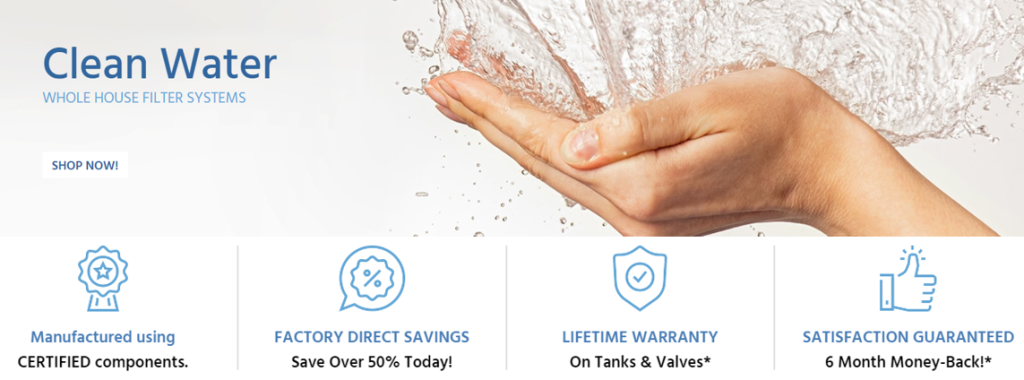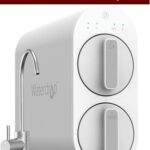If your city’s water has a high concentration of minerals, a water softener can help reduce mineral buildup in your plumbing.
If your municipality gets its water from a groundwater source, there’s a good chance you have hard water. This is water that contains a high concentration of dissolved minerals, such as calcium and magnesium. While hard water is safe to drink, it can cause problems in your home. That’s why many homeowners with hard water opt for a water softener.
Water softeners work by exchanging the hard minerals in your water for soft minerals, such as salt. This process is known as ion exchange. As the water softener exchanges minerals, it also regenerates itself using salt.
There are many benefits of using a water softener, including:
• Soap will lather better and produce more suds, which can lead to improved cleaning power.
Install a Home Water Filter & Get "Unlimited Safe Drinking Water" For Decades
Get Upto 55% Discount With a Lifetime Warranty & 6-Months Money Back Guarantee Free Shipping
SpringWell Water Filtration Systems: 100% American-Made & NSF Certified Water Filters and Water Softeners
• Your skin and hair will feel cleaner after showering.
• You’ll use less soap, shampoo, and laundry detergent, which can save you money.
• Water-using appliances, such as coffee makers and kettles, will have less mineral build-up.
• Dishwashers will run more efficiently and dishes will come out cleaner.
If you’re considering a water softener, the first step is to test your water to see if it’s hard. You can purchase a water hardness test kit at your local hardware store. Once you know your water hardness, you can choose the right water softener for
How Does Water Hardness Affect A Water Softener?
Water hardness decreases the efficiency of a water softener.

Water hardness is caused by minerals, specifically calcium and magnesium, dissolved in the water. The more minerals present, the harder the water. This can cause a number of problems, such as making it difficult to get soap to lather, leaving behind a film on shower walls and fixtures, and making dishes feel gritty. A water softener works by removing these minerals from the water.
There are a number of ways to measure water hardness, but the most common is grains per gallon (GPG). Water with 1-3.5 GPG is considered soft, 3.5-7 GPG is moderate, 7-10.5 GPG is hard, and anything over 10.5 GPG is very hard.
If your water is on the harder side, a water softener can make a big difference. The softened water will lather more easily, dishes will come out cleaner, and your fixtures will stay looking newer longer. In some cases, hard water can also cause plumbing problems, so a water softener can also help extend the life of your pipes.
To choose the right water softener, you’ll need to know the hardness of your water. This information is usually available from your local water utility. Once you know the hardness, you can choose a water softener that’s designed to remove the right amount of minerals.
If you’re not sure whether a water softener is right for you, contact a plumber or water treatment specialist. They can test your water and make recommendations based on your specific needs.
How Is The Water Hardness Determined?
The concentration of calcium and magnesium ions in the water determines the water hardness.
The hardness of water is determined by the amount of dissolved minerals in the water. The more dissolved minerals, the harder the water. The most common minerals that contribute to water hardness are calcium and magnesium.
There are a few different ways to measure the hardness of water. The most common method is to use a water hardness test kit. This kit will usually come with a hardness strip. To use the strip, simply dip it in the water for a few seconds and then compare the color of the strip to the included color chart.
Another way to measure the hardness of water is to use a digital water hardness tester. This tester works by passing an electrical current through the water. The more minerals in the water, the more the current will be hindered.
Hard water isn’t necessarily a bad thing. In fact, water with a high mineral content can actually be quite beneficial. However, hard water can cause some problems. For example, hard water can cause soap to not lather as well as it should. Additionally, hard water can leave behind mineral deposits on dishes, glasses, and plumbing fixtures.
If you’re having problems with hard water, there are a few things you can do. One option is to install a water softener. This device will remove the minerals from the water, making it softer. Another option is to use special soaps and detergents that are designed for hard water.
Determining the hardness of your water is a simple process that can be done at home with a water hardness test kit or digital water hardness tester. Knowing the hardness of your water can help you determine if you need to take steps to soften it.
FAQ
Why Is It Necessary To Have A Water Softener With City Water?
How Does A Water Softener Work?
Conclusion
If your city water is hard, you may need a water softener to improve the quality of your water. Hard water can cause mineral buildup in your plumbing and appliances, and it can also make your water taste bad. A water softener will remove the minerals from your water, making it softer and improving its quality.
If you still have any questions about water softeners, feel free to comment below.


